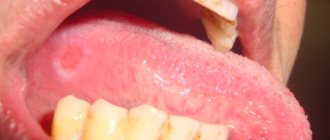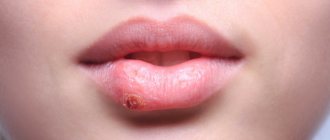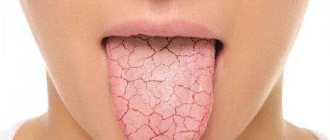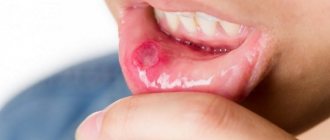Plaque on the tongue itself is not a disease, it is a symptom that reflects what is happening in the body. There are types of plaque on the tongue that indicate a disorder in the functioning of internal organs. These types of plaque are called pathological.
Author:
- Sadykhov Rahim Agalarovich
ENT pathology expert
3.54 (Votes: 13)
Plaque on the tongue itself is not a disease, it is a symptom that reflects what is happening in the body. In this regard, the statement that language is a mirror of our health is quite true. A slight transparent or whitish coating is normal for a healthy adult. It is usually noticeable after sleep and can be easily cleaned with a toothbrush. However, there are other types of plaque that are not so harmless and indicate a disorder in the functioning of internal organs. These are pathological types.
Pathological plaque can be different: the color ranges from thick white to black, dense and sticky in consistency, and has a bad odor. The structure of the language itself may also change. This is the first signal about the onset of the disease, so if you notice uncharacteristic changes in the appearance of your tongue, consult a doctor for a correct diagnosis. Indeed, in this case it is necessary to identify the root cause of this unpleasant manifestation and quickly begin to treat the underlying disease.
Plaque on the tongue: normal or not?
The human language is a kind of litmus test for the health of the entire organism. Normally, a healthy person should have a tongue without plaque, but this is ideal, which is rare today. If the tongue is coated, there are only two cases where you should not worry about it.
- After meal.
Eating foods such as strong tea, black coffee, red wine, blueberries, and beets causes temporary staining of the tongue and an unnatural coating on it, but both phenomena go away on their own and do not cause damage to health. - After the night.
A constant coating on the tongue in the morning is normal. At night, bacteria living in the mouth actively multiply, leaving traces of their vital activity. A thorough morning toilet will put everything in its place.
Tongue care kit from miradent.
Prevention
In order to no longer have problems with coating on the tongue (especially black ones), you need to:
- Actively participate in labor and social forms of life, i.e. lead a healthy lifestyle.
- Drink water - at least two liters a day.
- Do not consume foods or drinks containing dye.
- Eat right - eat vegetables and fruits as often as possible.
- Systematically carry out fortification.
- Pay as much attention to rest as possible.
- Follow the rules of hygiene - daily brush the surface of the tongue and teeth with antibacterial paste, using a toothbrush with soft bristles. After cleaning, rinse your mouth with a special rinse containing herbal ingredients.
- Do not exceed the course of antimicrobial prescribed by the attending physician.
- Visit the dentist's for preventive purposes at least once every six months. If you suspect a pathological process in your mouth, go immediately to a specialist.
- Rinse your mouth with decoctions of medicinal herbs.
- Do not abuse sugary energy drinks and cigarettes.
- Avoid alcohol.
- Replace black tea with herbal tea.
Only a doctor can answer the question of why the tongue turned black. So if a color change occurs without objective reasons (for example, consuming products containing natural, natural, synthetic or artificial dyes), then you should consult a doctor as soon as possible. He will select the appropriate treatment. You should not postpone the visit until later, as this can lead to serious complications.
If you do not follow the recommendations prescribed by a specialist for the treatment of the disease that provoked the appearance of a dark spot, the disease may become chronic, which means that the patient’s recovery process will be delayed.
At the first symptoms of dark plaque on the tongue, all hygiene procedures should be carefully carried out, carefully cleaning the surface of the tongue with a soft-bristled toothbrush and antibacterial paste for 3 minutes twice a day. Oral hygiene involves not only home procedures, but also qualified medical care, for example, ultrasonic teeth cleaning.
What if it's a disease?
A strong coating on the tongue and bad breath are already a reason to be wary. An experienced doctor will determine which disease the plaque on the tongue is a sign of, comparing the degree of density of the deposit, color and location.
Glossitis
One of the typical diseases characterized by plaque on the tongue is glossitis - inflammation of the tongue caused by injury or of an infectious nature. With glossitis, red spots appear on the tongue, which is why the disease is sometimes called “geographic tongue.” Read more in the article.
Gastritis
If your mouth is sour and there is a coating on your tongue, this is a sign of inflammation of the gastric mucosa. Usually the plaque disappears if you follow a diet.
Thrush
With thrush, the plaque is located under the tongue. It is distributed unevenly and has the character of spots.
Chlamydia
With chlamydia, a sexually transmitted disease, a thick, sticky coating appears on the roof of the mouth and tongue as a result of a malfunction in the immune system after an attack by chlamydia.
Bronchitis and pneumonia
Plaque on the sides of the tongue will indicate an upper respiratory tract disease. In most cases, it is whitish and is easily removed by brushing your teeth and tongue, but also quickly returns to its original place.
Alcoholism
A coating on the tongue after alcohol abuse is common. People talk about this figuratively: “It’s like cats have shit in your mouth.” However, in chronic alcoholics, the dark brown coating never goes away and is localized at the root of the tongue.
Cancer
If the tongue is coated, one cannot say with certainty that a specific type of cancer is present. But it is precisely this symptom, coupled with a number of other characteristics, that indicates a complication of an oncological disease (for example, a malignant tumor in the lungs).
Plaque on the tongue of a pregnant woman, with rare exceptions, is not a sign of illness - it is the result of changes in hormonal levels.
Language is an indicator of well-being
The doctor’s request “Show your tongue!” is the most common one during any examination. The language can be used to judge the condition of many human organs. In this case, any changes in the structure, shape or size of the tongue are important: color, presence of grooves, degree of smoothness, condition of the papillae, mobility, humidity and density.
If a coated tongue can still be explained by diseases of the throat or digestive organs, then a black coating on the organ can terrify anyone. What reasons can provoke such manifestations of the body?
Main causes of plaque
- Infection.
The main cause of plaque on the tongue in adults is infectious diseases, characterized by the uncontrolled proliferation of pathogenic microorganisms. - Impaired immune function.
When the body's protective barrier cracks, this serves as a catalyst for the activation of pathogenic bacteria, which usually occurs against the background of an increase in body temperature. - Gastrointestinal pathologies.
Various chronic ailments of the gastrointestinal tract caused by Helicobacter. Plaque on the tongue due to gastritis, if the disease is not treated, becomes denser over time and provokes bad breath. A clear sign of enterocolitis in adults is considered to be plaque on the root of the tongue. - Side effect of drugs.
Plaque on the tongue after antibiotic treatment is a common phenomenon. Medicines that include substances that inhibit the growth of certain pathogenic bacteria negatively affect the acid-base balance in the mouth, which entails an increase in the number of microorganisms “responsible” for the appearance of plaque. - The consequences of nicotine.
If you are an “experienced” smoker, then you shouldn’t be surprised by a gray or yellow coating on your tongue. Nicotine abuse has a detrimental effect on the microflora of the body in general and the oral cavity in particular.
Attention!
A provoking factor for the appearance of plaque on the tongue is also helminthic infestations, such as giardiasis. For differential diagnosis in this situation, it is necessary to take a stool test for helminth eggs.
Shades of dark color
The color of the tongue can really tell the doctor a lot about the condition of the patient's body. Dark masses on a muscular organ with various ailments have a certain shade.
- A signal about diseases of the digestive system, immunodeficiency, and hormonal imbalances is given by the dark green color of the tongue.
- Dark brown deposits occur with fungal infections, food poisoning, pulmonary diseases, as well as with hemolysis and adrenal insufficiency.
- Dark red deposits appear with scarlet fever, kidney infection, and advanced glossitis.
- With serious damage to the stomach and intestines, the plaque becomes dark gray.
- A black tint suggests cholera.
In addition, Crohn's disease is indicated by black spots on the receptor organ. Black deposits with an acetone odor indicate severe dehydration. Dark substrate and inclusions on the crowns indicate a chromogenic fungal disease. Any therapeutic program, as a rule, includes hygienic cleaning of the oral cavity. In our center it is performed by highly qualified hygienists.
What does plaque color tell you?
White
As we have already said, a thin white mucous coating on the tongue after sleep is not a deviation from the norm. A white coating of increased density indicates constipation, and a cheesy coating on the tongue indicates the unhealthy activity of yeast-like fungi of the genus Candida.
Yellow
A bright yellow coating on the tip of the tongue indicates hepatitis A (Botkin's disease). If there are problems in the functioning of the gallbladder, a yellowish coating and cracks appear on the tongue.
Dark
A dark coating on the tongue is a sign that something is wrong with the lungs. You don’t often see a completely black plaque: for example, in advanced stages of cholera due to dehydration of the body or in Crohn’s disease.
Diagnostics
Having identified in front of the mirror a change in the color of the mucous membrane in the oral cavity and plaque on the tongue, you need to seek help from a dentist as soon as possible.
The doctor will conduct an examination and during the conversation will find out whether the patient has any pathologies in the anamnesis. If he decides that the help of highly specialized doctors is needed, he will write a referral to them.
To identify the causes of the disorder and confirm the diagnosis, specialists will prescribe:
- general blood and urine analysis (if inflammatory processes in the body are suspected);
- bacteriological culture of microflora (to determine the sensitivity of the mucous membrane to antibiotics);
- coprogram (if there is inflammation in the small/large intestine);
- Ultrasound of the abdominal organs (if primary and secondary pathological processes in the liver are suspected);
- biochemical tests (to assess the condition of the digestive organ);
- fibrogastroduodenoscopy (checking for the presence of ulcers in the stomach).
And this is not the entire list of examinations, since if a particular disease is suspected, other diagnostic techniques are required.
What to do?
How to remove plaque from the tongue? To begin with, determine exactly the reason why the plaque occurs and treat the underlying disease by following the doctor’s instructions. For preventive purposes, in order to minimize the amount and density of plaque, you must follow simple rules of personal hygiene:
- brush your teeth in the morning and before bed with toothpaste and a brush that has a tongue cleansing pad;
- use antibacterial mouthwash;
- use a special spoon to clean the tongue, moving from its periphery to the front surface.
For a detailed article on how and how to properly clean your tongue from plaque, read a separate article.
How to treat black tongue
Complete elimination of a symptom depends on the source of its occurrence. This is what therapy is aimed at, including various methods, such as:
- Compliance with a special diet if the cause of plaque is gastrointestinal pathology.
- Medicines to combat inflammation, pathogenic bacteria and associated symptoms.
- Physiotherapy.
- Folk remedies.
- Surgical intervention in difficult situations when other treatment methods have proven ineffective.
Effective formulations include tinctures and decoctions for rinsing the mouth. They are based on the following medicinal plants;
- Linden;
- oregano;
- yarrow;
- chamomile;
- plantain;
- oak bark;
- mint;
- sage;
- strawberries;
- flax seeds.
What to look for when examining your tongue
An adult brushes his teeth every day. The same mandatory rule for any person should be a daily inspection of the tongue.
When examining the tongue, it is important to pay attention to its:
- color;
- plaque;
- surface structure;
- mobility;
- symmetry;
- the appearance of bubbles, pimples, spots and other inclusions.
If a black coating appears on your tongue, it is also important to remember other symptoms:
- past illnesses or stress;
- temperature increase;
- drug treatment;
- consumption of alcohol, nicotine, etc.
Treatment of glossitis of the tongue
First of all, the treatment plan depends on the type of inflammation. It is compiled individually, based on clinical and diagnostic data. For acute catarrhal glossitis, it is important to remove the irritating factor: replace the crowns or, conversely, put crowns on the damaged tooth. Change your eating habits, stop chewing nuts, hard candies, and crackers.
For a folded tongue, oral hygiene comes to the fore.
If lumps and papillomas grow during rhomboid glossitis, they are excised. Laser surgery allows you to do this quickly, with virtually no blood.
The main recommendation for black tongue is treatment of somatic diseases and smoking cessation. Liquid nitrogen is used to remove papillae, as well as applications to keratinized areas.
But there is a general approach to treatment:
- sanitation of the oral cavity;
- professional teeth cleaning;
- vitamin complexes;
- iron supplements for anemia;
- for pain - light anesthetics in the form of applications;
- for burning - oral baths and irrigation;
- physiotherapeutic procedures;
- checking for fungal infections.
There are many recommendations on the Internet for treating glossitis with folk remedies. No one disputes the anti-inflammatory properties of chamomile, sage and plantain. When a spot appears on the tongue, applications of sea buckthorn oil and aloe juice can bring relief. But these measures are temporary, they affect the symptoms, but the cause of the disease remains unattended. As a result, it is easy to miss the point when it was not difficult to fix the problem.
Glossitis is closely related to common diseases and psychological causes. Effective treatment is only possible using an integrated approach. How to treat glossitis and what examinations you need to undergo can only be advised by a qualified doctor. Glossitis can be cured quite quickly, but if left untreated, abscesses, tumors, and necrotic tissue changes can form. This is much more serious and the prognosis is not so favorable.
Measures to be taken
Photo 2: If the color of the tumors does not lighten within several days, then it is necessary to urgently visit a doctor to rule out pathologies such as tongue cancer, glossitis and other diseases.
Source: flickr (Olalla Esquimal). To get rid of stains, it is necessary to determine the root cause of their appearance and eliminate it . A number of diseases accompanied by this symptom can be easily cured with the help of medications and vitamin complexes. Along with medications taken orally, treatment of the organ surface . This procedure is carried out using the following means:
- decoctions of sage and chamomile;
- Imudon or Lysobact tablets;
- solutions of miramistin or chlorhexidine;
- treatment in a hospital with liquid nitrogen.
If fungal infection occurs , bifidobacteria and lactobacilli and probiotics are prescribed to normalize the microflora, as well as antifungal drugs such as nystatin, livarol, fluconazole or diflucan.
Oral fibroma
Fibroma is a benign tumor that has the shape of a polyp or dome, that is, it is a formation that resembles a hard, smooth round lump, which with its base or stem is attached to the tissues of the oral cavity. They look like moles and freckles and may have a dark color. Fibroma can occur for various reasons, for example, due to irritation caused by exposure to dental devices, piercings, and teeth.
Therapy for such a tumor can only be surgical; however, surgery does not guarantee that the tumor will not reappear in the same place. Treatment should not be neglected, since fibroids can multiply and grow. In addition, you should avoid damaging the tongue, particularly in the area where the fibroid was previously located. Trauma can trigger its growth again.
Oral cancer
Tongue melanoma is a less common type of oral cancer. Brown spots on the tongue caused by oral cancer are extremely rare. You can assume the occurrence of cancer if its appearance is accompanied by other symptoms - difficulty moving the jaw when speaking, swallowing, bleeding wounds on the face, neck, mouth, hoarseness, chronic soreness in the throat.
In this case, you should not give in to panic; cancerous tumors can be treated with chemical medications, radiation, which destroys carcinogenic cells, as well as through surgery aimed at removing the tumor.











